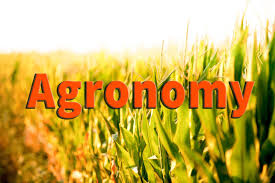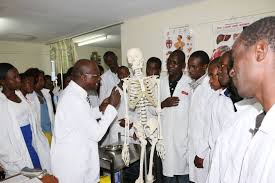Agronomy was derived from the Greek derivatives ‘Agros’ and ‘nomos’ which respectively mean ‘field’ and ‘management’. According to Wikipedia, Agronomy is the science and technology of producing and using plants for food, fuel, fiber, and land reclamation. Agronomy has come to encompass work in the areas of plant genetics, plant physiology, meteorology, and soil science. It is the application of a combination of sciences like biology, chemistry, economics, ecology, earth science, and genetics. Agronomists of today are involved with many issues, including producing food, creating healthier food, managing the environmental impact of agriculture, and extracting energy from plants.
Agronomy is a branch of agricultural science which deals with principles and practices of soil, water and crop management.
An agronomist is a professional with a versatile set of roles and functions which are essential to the sustenance of life and in turn benefit human society. Since the dawn of human civilization and ever since man gave up his nomadic ways of living and began the practice of cultivation, having outgrown the hunter-gatherer stage of his existence, agriculture has played a vital role in his eternal quest to fathom the mysteries of nature. Agronomists have contributed in no small measure to this evolving story.
Scope of Agronomy
There is a gradual increase in scope for agronomists. Agronomists will be needed to find ways to increase the output of crops used in these products. Agronomists will also be needed to balance increased agricultural output with protection and preservation of soil, water, and ecosystems.
- Yield maximization with introduction of new cultivars/ HYVs
- Reduced cost of production due to proper crop management
- Better water use efficiency due to agronomic knowledge
- Special tillage and intercultural operations for better crop growth and maximizing harvesting index
- Appropriate soil fertility management can increase crop yields with lesser use of fertilizer for increased profit
- Reduced post harvest loss due to agronomic knowledge and practices
- Intensive cropping patterns and integrated farming systems for sustainable agricultural growth and increased food production per unit area to feed teeming millions every year.
Skills and Competencies Required to as a Graduate of Agronomy
- Analytical ability
- Problem solving
- Critical thinking
- Decision making
- Communication
Qualities of an Agronomist:
- Dependable
- Ethical
- Cooperative
- Stress tolerance
- Patience and persistence
- Adaptability
Role of Agronomist:
- Agronomist aims at an obtaining maximum production at minimum cost by exploiting the exploiting the knowledge developed by basic and allied/applied science.
- In a board sense he is conceder with production of food and fiber to meet the needs of the growing population.
- He has to test the suitability of research finding of others specialists in the field and accept them finally and also judge the reaction of the farming community.
- He is a coordinator of different subject matter specialist and act as a physician who concern with other SMS.
- He carries out research on scientific cultivation of crops taking into account the effect of factors like soil climate, variety of crops production techniques suitably depending on the situation.
- He is the key person with working knowledge of all disciplines and coordinator of different subject matter specialists.
Career Opportunities for Agronomy Graduates in Nigeria
Agronomists can have many career paths, however, most their careers are generally focused on increasing the quality and amount of food produced for the nation’s food supply. Many Agronomy graduates are employed in farm management or go on to manage their own farms, others use the breadth of skills and experience that they develop during their degree to follow a range of opportunities in the service and supply industries.
- Agricultural Climatologist.
- Lecturer
- University Professor
- Agronomist.
- Agronomist Sales.
- Biological Science Technician.
- Biotechnology Technician.
- Chemical Sales Representative.
- Crop Consultant.
- Crop Production Specialist.
- Environmental Scientist
- Fertilizer Plant Manager
- Research Assistant
- Soil and Water Conservationist
- Lab technician
- Crop Scientist
Admission Requirements for the study of Agronomy in Nigeria
The O’level subject combination and requirements needed to study Agronomy;
You require;
Five SSCE credit passes in Chemistry, English Language, Mathematics, Biology and Geography or Economics.
In UTME, please note that English Language is Compulsory for this course. Therefore, the three (3) other JAMB UTME subject combination needed to study Agronomy under the Faculty of Agriculture in the above Universities include;
» Chemistry, Biology or Agriculture and Physics or Mathematics.
Please check Jamb brochure for requirements for each school.
SOME INSTITUTIONS WHERE YOU CAN STUDY AGRONOMY
- • Adamawa State University • Enugu State University of Science and Technology • Nasarawa State University • Osun State University • Taraba State University • University of Ibadan















